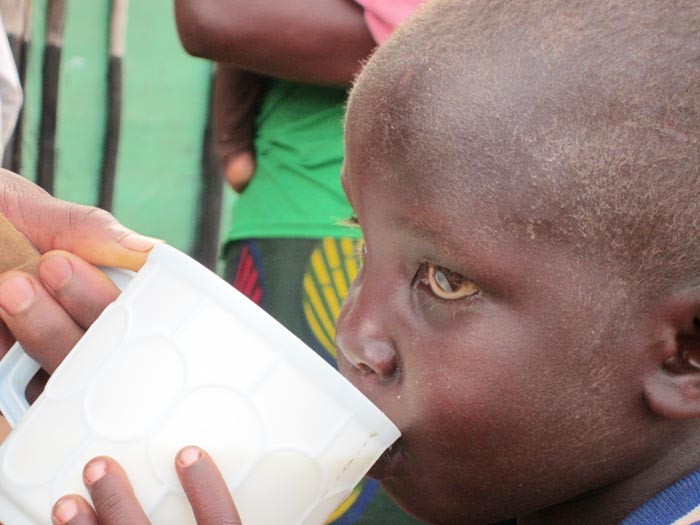Despite a significant food self-sufficiency potential, Burundi is one of the 79 countries most affected by food insecurity and listed in the Global Hunger Index. Even the recent UNICEF’s analysis figures about the malnourished children in Burundi have given us an alarming situation– by Joanna Nganda
58%. This is the number of chronically malnourished children under 5 years old in Burundi; in other words, more than half of all Burundian children are suffering, i.e. 3 out of 5 children. One third of the under 5years old children’s death is caused by malnutrition.
Malnutrition in such fragile and young individuals causes irreversible damages like delays in physical growth and intellectual development of the children; therefore, highly jeopardizing their performance at school. Malnutrition has also a serious economic and social impact on the development of the country.
Surprisingly enough, malnutrition doesn’t only concern poor people but rich people as well, respectively at 70% and 41.4%. The chronic malnutrition is caused by development issues, the factors are many and already known: poverty, demographic factors, food insecurity in the households, a low supply in micronutrients, and inappropriate practices in nutritional supplements. But the causes are not sometimes obvious.
The mother’s role
UNICEF’s analysis states that Burundian women have a weak authority within the family and in the society in general, but they are highly respected as mothers. Despite not being the family providers, mothers are the care-givers responsible of the well-being of their children, daily hygienic household activities and meal preparation.
A study shows that the more educated are the mothers, the better nourished are the children. In fact, children born of mothers with a primary education level have 94% of fewer risks to have a delay in growth compared to the ones born of mothers with no primary education at all. Mothers with a secondary education level have even 3 times fewer chances to raise malnourished children. Even if the children start to show signs of malnutrition, the education of the mother allows a proactive management of the disease instead of being fatalistic; the educated mother also knows the crucial importance of an exclusive breastfeeding for the required amount of time (6 months) and the necessity of raising her children in a clean environment to avoid diseases like diarrhea, a factor that worsens malnutrition.
In addition to all the above mentioned facts, the mother who follows the birth planning with at least 48 months between births gives her children another chance to grow better and with a better nutrition.
Among young malnourished children, it’s hard to think that there are other more fragile ones like HIV positive and malnourished children. According to Mrs. Candide Kayonde the Coordinator at ANSS, HIV can lead to malnutrition while a poor diet can in turn, speed up the infection progress; shortly speaking, the vicious cycle begins.Since long it has been known, among HIV positive people, that a weight loss highly predicts illness or death; losing as little as 3-5% of body weight significantly increases the risk of death for small children. HIV has a strong action on the metabolism which, as we know, depends on nutrition; imbalance either in HIV or nutrition will lead to dangerous complications.Without the correct type of food in correct quantities, small children who are already weakened by HIV, will be severely malnourished and expose their weak immune systems to opportunistic infections.
According to UNICEF analysis, the government, with the help of organizations like SUN (Scale-Up Nutrition), UNICEF, FWP, FAO and WHO to name a few, has done a lot but many things are still needed to be done.Some solutions seem to be quite simple but requiring financial support like the supplements in vitamin A and in iron which, during the first 1000 days of life, are an investment for a better health hence resulting in fewer expenses related to medical charges.But the hardest part is cultural change: improving girls’ education (future mothers), pushing mothers to be more independent; raising their awareness on nutrition (creating balanced meals) and hygiene.Children are the most vulnerable individuals of our society and the future arms that will build the nation which will need strong arms. Their nutrition should be the number one priority. History itself shows that providing good nutrition to children and mothers promotes the economic development of the country (Western Europe in the 1970s).Talking about economic development and as UNICEF estimates it, Burundi will lose $102 million per year if nothing is done to stop malnutrition; that means twice as much as the 2012 base budget allotted to the Ministry of Public Health and Fight against AIDS.
– Individual productivity losses related to the mediocre body condition of the labor force;
– Indirect losses due to the bad grades and poor performance of the malnourished students,
– Economic losses caused by the expensive costs of the medical charges which would have been avoided if the children were healthy.




















 IWACU Open Data
IWACU Open Data

